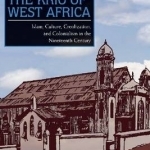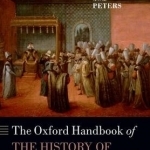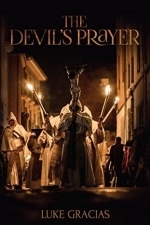
Thailand's Islands & Beaches
Lonely Planet, Austin Bush, Mark Beales and David Eimer
Book
#1 best-selling guide to Thailand's islands and beaches* Lonely Planet Thailand's Islands and...

Keith and The Girl comedy talk show
Podcast
If you're easily offended, this podcast is not for you. Keith and The Girl (KATG) is a fast-paced...

Ode to Color: The Ten Essential Palettes for Living and Design
Book
Internationally renowned textile designer Lori Weitzner presents a novel, layered perspective on the...

The Krio of West Africa: Islam, Culture, Creolization, and Colonialism in the Nineteenth Century
Book
"The Krio of West Africa: Islam, Culture, Creolization, and Colonialism in the Nineteenth Century,...

The Oxford Handbook of the History of International Law
Bardo Fassbender, Anne Peters, Simone Peter and Daniel Hogger
Book
The Oxford Handbook of the History of International Law provides an authoritative and original...

Loving Justice, Living Shakespeare
Book
In thinking about Justice, we ignore Love to our peril. Loving Justice, Living Shakespeare asks why...
Lottie disney bookworm (1056 KP) rated Six Tudor Queens: Katharine Parr, The Sixth Wife in Books
Mar 23, 2021
To Netgalley and Headline, thank you, thank you, thank you!
It is my opinion that Katharine Parr is often the most overlooked of Henry VIII's wives: indeed most novels focus only on her life after becoming Queen. That is why this novel from Alison Weir was simply brilliant.
Weir introduces us to Katharine Parr as a girl, constantly surrounded by family and, after losing her father at a young age, being brought up by her uncle, aunt and her mother who was an attendant to Queen Katharine of Aragon.
The reader instantly falls in love with Katharine, an intelligent, caring child who is acutely aware of her eventual duty to her family but desperately wishes to remain in her carefree days with her siblings.
As we know, Tudor girls married young and Weir explores each of Katharine's four marriages in great detail: combining historical fact and storytelling in the way that only she can.
It struck me that, in three of Katharine's four marriages, she was used as a pawn, marrying for rank, power and connections as was the norm at the time.
However, in every one of these marriages Katharine was able to find love; even when marrying an old overweight Henry, already famous for disposing of numerous wives.
The writing during each of these marriages is rarely emotional: Katharine is a very rational and practical character, only showing real passion for religion. She is even super calm when she believes she is being investigated as a heretic!
It isn't until Katharine's fourth and final marriage that she marries for herself and for love. The passionate relationship between Katharine and Tom Seymour seeps into the writing at this point: introducing jealousy and anger where there has previously been merely a stoic resolve.
The fact that this novel spans the lifespan of Henry's marriages is fitting and really allows Weir to paint a picture of Tudor society throughout the religious reforms and upheavals associated with its monarch.
No one who has read Alison Weir's books before will be surprised that this is yet another success. Together with Philippa Gregory, Weir is a Queen of historical fiction and this novel is only the latest jewel in her crown.
BookInspector (124 KP) rated The Devil's Prayer in Books
Sep 24, 2020
What drew me to this book was the blurb, it sounded really intriguing to me. Once I started reading the book, I thought I will be disappointed, as it sounded really historical to me, and I had no idea what was going on, but once I carried on it absorbed me. The main character in this novel supposed to be Siobhan, but her mother Denise took all the spotlight, as most of the book was about Denise. The author told the stories through multiple perspectives, and that made the book really compelling. I really liked Denise as a character, she was really interesting and I felt really sad about what happened to her. I think that Siobhan didn’t fully open as a character in this book, and I hope that it will change in the future.
The plot of this novel was very very well researched and really gripping. I really enjoyed all the unexpected turns and twists of this story, which kept me hooked till the last page. There are some parts which sound unrealistic, but I think, it gave this book a unique charm. I really enjoyed how Luke Gracias portrayed religion in this novel, it was amusing to read. Even though historical parts were crucial in this novel to understand it better, my mind tended to wander away while reading those historical parts of it. ( Have no clue why…)
The writing style of this book was creative and pleasant to read, and I have to warn you all that there is rape, drugs, and a lot of violence in this book, so it is not for weak stomach holders. The chapters are a decent length and it did not drag to me at all, because the story sucked me in, and it was hard to put it down. The book ended with a cliffhanger and I will be waiting for the next book impatiently. (It has to continue!!!) So, to conclude, it was a stunning novel filled with amusing story and it is really sad this book is available only as an E-book. I do hope that a smart publisher will consider this book because I think it is a must read for sure...
Lee (2222 KP) rated Saint Maud (2020) in Movies
Oct 6, 2020
Maud is a lonely, isolated, and very religious young woman, and as she sits in her sparse little bedsit, she prays to God in the hopes that he will guide her as she begins her new role. That new role sees her taking over as carer for Amanda (Jennifer Ehle), an ex-dancer whose body is now succumbing to terminal cancer. As Maud feeds, bathes and generally does everything for Amanda, her obsession with her faith and religion begins to send her into a downward spiral, becoming increasingly convinced that her personal mission from God is to save Amanda's soul. Amanda’s lifestyle choices and love-life are often at odds with Maud’s beliefs, eventually resulting in tensions between them.
'In my head, she's very much this person who has felt really alienated her entire life and has always found it really difficult to connect with other people,' explains British director Rose Glass about the lead character of her feature-length debut. Morfydd Clark fills that role brilliantly, with her calm and innocent voice narrating much of the film through her prayers, and we experience her failed attempts at connecting with others while on a rather heavy and eventful night out on the town. An ominous score also helps to set the tone, along with a rather gloomy colour palette, and there is a general feeling of dread throughout.
Aside from that, it’s fair to say that Saint Maud really didn’t work for me at all. I was fully invested in the character of Maud, how faith was shaping her, and how her relationship with Amanda was affected. But two thirds into this slow-burn character study of a young woman essentially going through a breakdown, I was bored and desperate for something to happen. Considering the runtime is only 84 minutes long, that’s not good.
A last-minute burst of chaos and horror provided a glimmer of hope but was very short-lived. And an attempt to deliver powerfully, memorable imagery only resulted in laughs from my cinema audience the likes of which I haven’t experienced since the ending of Hereditary.

Greek Orthodox Calendar
Reference and Lifestyle
App
----------------------------------------- Original Greek Orthodox calendar for iPhone! #1 current...


